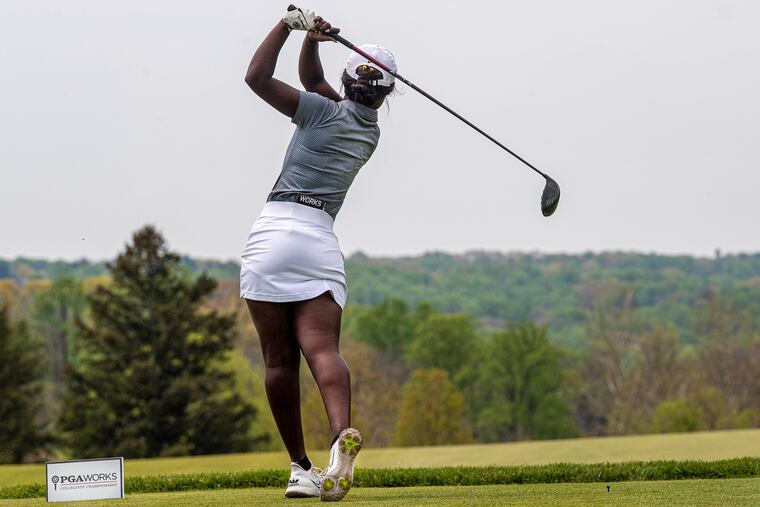PGA WORKS offers collegiate golfers an opportunity to play — and learn — in Philly
This year’s championship teed off from two Union League courses — Liberty Hill and Torresdale — in Philadelphia for the first time in its 35-year history.

The PGA WORKS Collegiate Championship has a straightforward mission: diversify golf by cultivating an environment that grows the game and keeps golfers around after graduation.
In 1986, then-Jackson State coach Eddie Payton, along with one of his players, Mark Nance, and the Negro Golf Association acknowledged the exclusion of HBCUs from competing in postseason play.
“With that, we created our own, [then called the National Minority College Championship],” said Loritz “Scooter” Clark, director of the PGA WORKS Collegiate Championship. “I say it all the time that we created our own out of necessity. But what we have today is because of that idea.”
» READ MORE: Jalen Brunson and Mikal Bridges offer a blast to Villanova’s past | Mike Jensen
The following year, in 1987, the first tournament was held at Highland Park Golf Course in Cleveland, Ohio. Inspired by the founding motive, it both afforded the opportunity for postseason play while driving funds back to those HBCU golf programs.
This year’s championship teed off May 2-4 from two Union League courses — Liberty Hill and Torresdale — in Philadelphia for the first time in its 35-year history. The 54-hole tournament, which was played at the top-ranked city club in the country, came courtesy of a partnership between the Union League and PGA WORKS.
TPC at Sawgrass in Ponte Vedra Beach, Fla., was the site for last year’s tournament. It was canceled in 2020 but was previously played in Port St. Lucie, Fla., dating back to 1998, when it moved from Cleveland.
Throughout the three days of competition, the level of golf rises with the importance. But the original tenets of creating diverse competition (In 2021, 82% of players listed themselves as “non-white.”) while promoting opportunities within the $84 billion industry remain prevalent.
Clark, who played and coached in the PWCC before later becoming the tournament director in 2010, often finds himself in conversations about how golf has changed. “It’s not the stuffy sport that it used to be,” Clark said.
The efforts by PGA Works and its partners advocate for jobs around golf for people of all backgrounds and skill levels. As Clark says, you don’t have to be good at golf to work in finance and digital marketing or as engineers and broadcasters.
But it moves the game forward.
“I think we’re on the right path right now,” Clark said. “We’ve got all the makings and all the things in place to create sustainable change for the industry. But I would say the one thing from looking at it is creating resources and opportunities over a period of time. That’s exactly what we’re working on.”
Clark was first introduced to the tournament as a senior at Paint Branch High School (Burtonsville, Md.) and a member of the Bill Dickey Scholarship Association, which provides opportunities in and around competitive golf for young people of color.
When he was 17 years old, he was struck by lightning. He’ll be the first to tell you he’s lucky to be alive after spending over 36 hours in a coma. The doctors told his family he’d be brain dead for the rest of his life. But if given the chance, a healthy 52-year-old Clark would tell his 17-year-old-self, “We finally figured out what that second chance was for.”
His life’s work has become to carry on the legacy of the championship.
The day before the tournament began, more than 200-plus student athletes representing more than 30 schools packed into an arch-shaped, rising auditorium on the 18th floor of the Comcast Technology Center for a series of career exploration panels collectively called, “Beyond the Green.”
“There’s been a myth that in golf, you either play it or teach it and that’s kind of it,” said Rachel Melendez-Mabee, the PGA WORKS program specialist for PGA Reach. “I feel like there’s a renewed interest in what our industry can offer… The more we are intentional with those efforts the more students are inclined to pursue some of those unique opportunities.”
Comcast, Union League, PGA of America, Citizens Bank, Bank of America, among others, all had representatives for student athletes to speak with about potential jobs or internships.
» READ MORE: Which Flyers Should Stay or Go? Swipe and Decide
Melendez-Mabee, who admitted she may have some bias, said she hasn’t seen another collegiate golf event that holds a networking portion to the same degree. PGA Works was outfitted with bright lights, emcees, prizes, a DJ and two hours of career panel conversations on Sunday.
Panelists shared parables about the importance of challenging tradition and discussed the lack of storytelling in golf. They also lobbied for jobs in the sport if a pro career isn’t in the cards, painting it as an avenue to other professional endeavors. The event left athletes eager to network and inspired to find job opportunities.
Starting Monday morning, it was all business, with the first groups teeing off at 7:30 a.m.
“Golf is a galvanizing force that we can utilize to change society,” said Kyle Bowser, senior vice president of the NAACP Hollywood Bureau. “And that’s where you guys come in because if you’re on those fairways people will see you and they’ll say, ‘Wait a minute, that person swings a club just like I do. Maybe they’re not as different from me as I thought.’”